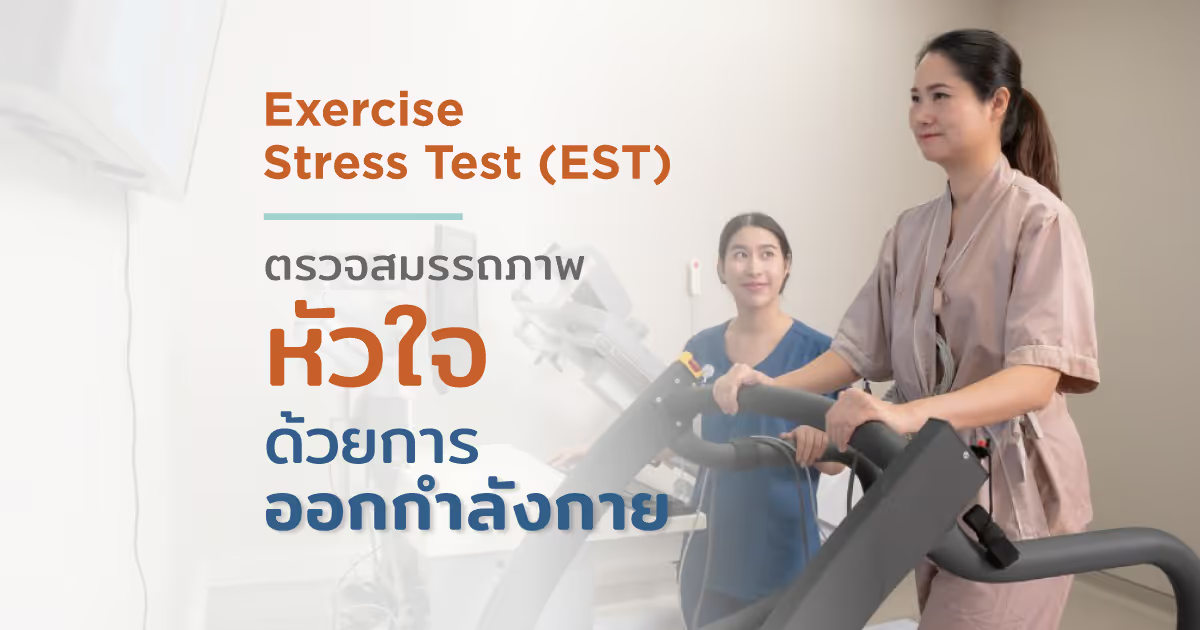Choose the content to read
- Exercise Stress Test (EST)
- Who requires exercise stress tests?
- What are the different types of stress tests?
- Who is not eligible for exercise stress tests?
- Preparation for EST
- Stress test results
Exercise Stress Test (EST)
Exercise stress testing is a test to evaluate how the heart functions during physical exertion when the heart has a high oxygen demand. There are several methods for conducting this type of testing. Those taking the test must briskly walk or run on a treadmill or pedal a stationary bike with heart rate, blood pressure, blood oxygen levels, and cardiac electrical activity under monitoring and recording. Their physical fitness can be measured and compared to others of the same gender and age. This form of heart fitness assessment allows physicians to gauge the risk of heart disease for individuals undergoing the test.
Who requires exercise stress tests?
Your doctor will determine your age, gender, personal and family history of heart disease, lifestyle, and risk factors such as smoking and health conditions to gauge if you need exercise stress tests.
Exercise stress tests may be appropriate for people with the following symptoms:
- Chest pain
- Irregular heartbeat
- Shortness of breath
- Dizziness
Individuals with risk factors such as diabetes, hypertension, hyperlipidemia, a family history of premature heart disease, those in high-risk occupations like pilots or professional athletes, and individuals without known heart disease can undergo exercise stress tests. These tests help assess whether they are at risk of developing heart problems, including:
- Congenital heart disease
- Congestive heart failure
- Coronary artery disease
- Heart valve disease
- Hypertrophic cardiomyopathy
Individuals with heart disease may need to undergo exercise stress tests if:
- They plan to start a new exercise regimen.
- They are currently under treatment, and medical professionals desire to assess their effectiveness.
- They are likely to develop complications based on their personal or family history.
- They have diabetes or other health issues that heighten the risk of heart disease.
What are the different types of stress tests?
- Exercise stress test
The test can detect evidence of coronary artery disease. You'll walk on a treadmill or pedal a stationary bicycle. The speed and elevation of the treadmill will progressively increase to assess your walking ability and level of fitness. Continuous electrocardiogram (EKG) monitoring will be in place during the test to detect any signs of cardiac ischemia. - Exercise stress echocardiogram
If your exercise stress test is inconclusive, the doctor may recommend an exercise stress echocardiogram. The ultrasound images can show how well your heart muscles and valves work, visualize your heart muscle contraction and intracardiac blood flow, and the impact of physical activity. - Nuclear stress test
This cardiac imaging scan uses safe levels of a radioactive substance to evaluate heart function. The test will capture the images of your heart at rest and after physical activity to compare the myocardial blood perfusion. A reduction in blood perfusion indicates the presence of blockages in one or more coronary arteries.
In addition, nuclear stress tests can help:
- Assess the severity of coronary artery disease blockages.
- Evaluate the effectiveness of treatments like stents or bypass surgery.
- Offer a non-invasive diagnostic method so you can avoid cardiac catheterization.
- Determine the suitability of your heart for non-cardiac surgery or physical activity.
- Cardiac rehabilitation stress test
It involves a closely monitored exercise program designed for individuals with heart conditions. You will need to undergo a before and after cardiac rehabilitation stress test.
- Before cardiac rehabilitation, a stress test is necessary for designing a suitable exercise program.
- After cardiac rehabilitation, a stress test evaluates your progress and helps develop an appropriate long-term exercise program after rehabilitation.
Who is not eligible for exercise stress tests?
Exercise stress tests are not appropriate for people with the following heart conditions as they can cause complications.
- Aortic dissection
- Endocarditis, pericarditis, or myocarditis
- Recent heart attack
- Severe aortic stenosis
- Arrhythmia
- Persistent chest pain
Preparation for EST
Before the procedure
- Refrain from consuming tea, coffee, energy drinks, or foods containing caffeine for 24 hours before the procedure.
- Do not smoke or use tobacco products.
- Consult your doctor if you need to stop taking medications, including beta-blockers and inhalers for asthma, on the test day.
- If you have diabetes, check with your doctors before skipping any meal, and you should bring along a glucose monitor on the day of the procedure.
During a stress test
- Electrodes will be placed on your chest to record your heart's electrical activities and blood pressure measured during the test. You may need to exhale into a tube for a breathing test.
- You will begin an exercise on a treadmill or stationary bike from a slow to a faster pace until reaching the targeted heart rate. If you develop the following symptoms, you should stop exercising and inform a healthcare professional.
- You feel moderate and severe pain in the chest.
- You have severe dyspnea.
- Your blood pressure becomes alarmingly low or high.
- You have an irregular heartbeat.
- You feel dizzy and exhausted.
If you cannot exercise, an IV medication may be given to stimulate heart rate and muscle contraction like you are exercising.
After a stress test
- A 15-minute observation of your heart rate, blood pressure, ECG, and condition is routine. You can go home if all is well.
Stress test results
A normal test indicates the heart is functioning well with sufficient blood perfusing the heart. Individuals experiencing chest pain or rapid heartbeats may need additional testing to identify the cause of their symptoms. People planning to start exercising or undergoing surgery can proceed as their heart health is robust. For patients with preexisting heart disease, a normal test indicates the treatment is efficacious.
If the test results are abnormal, it signifies the presence of heart disease. In less severe cases, physicians may recommend lifestyle changes such as quitting smoking, exercising, maintaining a healthy weight, and taking medication to control underlying conditions like diabetes, high blood pressure, or high cholesterol to prevent symptoms from worsening.
If ischemic symptoms develop during an exercise stress test, further workups, such as cardiac catheterization or computed tomography coronary angiogram, may be advised. Individuals planning to engage in an exercise regimen or undergo surgery may need intervention to prevent sudden heart attack or heart failure. For patients already receiving treatment for heart disease, abnormal test results indicate the current treatment approach is not yielding the desired results, necessitating adjustment in the treatment plan.









